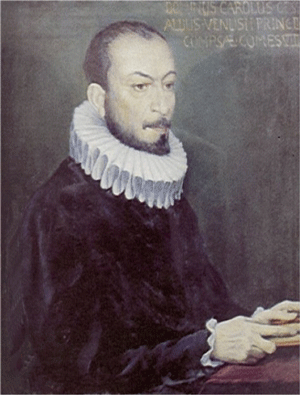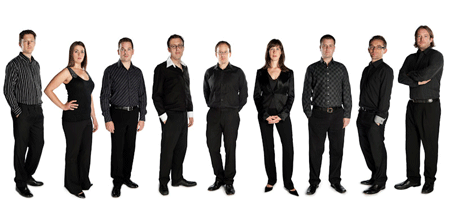Carlo Gesualdo, Prince of Venosa, was the warp between which the weft
threads of modernism were woven. Madrigalist, mannerist and master of harmonic
ingenuity, the patrician composer’s contributions to the genre are remarkable
for their harmonic capriciousness and volatility. Much is often made of the
fact that one can add ‘murderer’ to the alliterative inventory of the
composer’s roles, his violent despatch of his faithless wife and her lover
earning him notoriety in the annals of music history; and, while such vengeful
acts were in fact common in Renaissance Italian courts — indeed, the
contemporary code of honour practically demanded them — it is perhaps not too
fanciful to imagine that something of Gesualdo’s brooding, melancholic
temperament is evident in the turbulent harmonic daring of his madrigals.
It has been suggested that Gesualdo’s harmonic adventurousness was
inspired by his visits to Ferrara from 1594, where he was able to experiment
upon the archicembalo with six keyboards that had been constructed by the court
maestro Nicola Vicentino. But, it is just as likely that overhearing the vocal
ensemble that Vicentino had trained in secrecy, in order to put into practice
his own experimental theories of music, was the major influence in the
formation of Gesualdo’s idiosyncratic idiom.
 Carlo Gesualdo, Prince of Venosa [Source: Wikipedia]
Carlo Gesualdo, Prince of Venosa [Source: Wikipedia]
Writing of a new edition of the madrigals published in1962, the musicologist
Denis Stevens declared, ‘Five fine soloists, each with perfect intonation,
not too much vibrato, and a really controlled line, would bring … [the]
splendid pieces in this book to life’. ‘Dolcissima mia vita’ (Sweetness
life of mine) immediately asserted the composer’s highly personal vein of
chromatic irregularity, and five members of Exaudi , although they took a few
minutes to settle, certainly brought vitality to the contrapuntal lines,
‘Credete forse che’l bel foco ond’ardo’ (Can you believe the fire that
now scorches me), triggered by a buoyant countertenor line sung by Tom
Williams.
The sliding chromatic resolutions of ‘Deh, come invan sospiro’ (Ah! How
I sigh in vain) demonstrated the composer’s skill in expressing the struggle
between violent, conflicting emotions, while the closing repetitions of
‘divenga morte’ (life for me has become death) spanned a spectrum of
colours and moods, both rich and shadowy. In ‘Tu piangi, o Filli mia’ (You
weep, O my Phyllis), the five voices blended agreeably; in an energetic
rendition, the strong communication between the members of the quintet was
evident in the vivid sectional contrasts that were achieved.
Gesualdo’s almost hypersensitive response to lyric emotions is unfailingly
astonishing, as the individual vocal lines veer in unexpected directions, the
linear discourses producing a questing, searching mood as dissonances are
suspended and resolutions delayed. In ‘Itene, o miei sospiri’ (Go now, o my
sighs) the sheer force of the harmonic energy was remarkable, building from the
initial direct command, ‘Itene’, to the rich contrapuntal interweaving of
the climax, before the relaxation of the concluding homophonic thirds. The deep
register of the opening of ‘O tenebroso giorno’ (O dark day) was
forbiddingly sombre, before the more uplifting harmonies of ‘Quando lieto
ritorno/ Farai dinanzi a quella/Che è più d’ogni altra bella’ (When will
you happily/ return to that beauty’s side/ who is more beautiful than any
other) created a flowing lightness. The voices negotiated the unusual,
challenging intervals of the melodic lines with pinpoint accuracy, and the
final phrase possessed a pure air of expansiveness: ‘Che con suoi sguardi
morte e vita appaga?’ (whose gaze satisfies both death and life?’).
The rich open vowel sounds of ‘O dolorosa gioia’ (Oh dolorous joy), sung
with lustrous timbre, opened the second half of the recital; the five vocalists
enjoyed the harmonic paradoxes used to convey the oxymoronic verse —
unexpectedly easeful major harmonies suggest ‘soave dolore’ (sweet
suffering), for example. The final line, ‘Poichè sì docle mi fa morto e
vivo’ (for so sweetly it makes me feel both dead and alive) had both
immediacy and aloofness. The fitful changes of mood of the brief ‘Moro,
lasso’ (I die, alas), were powerfully communicated, the despairing cry,
‘Ahi, che m’ancide e non vuo!’ (oh, kills me and will not help me!), full
of rhetorical directness.
Two madrigals à 6 brought the sequence to a close: ‘Tenebrae factae
sunt’ (Darkness covered the earth) had both solemn depth and warmth, while
the incessant suspensions and twists of ‘Caligaverunt oculi mei’ (My eyes
are dimmed), particularly in the final homophonic section, were meticulously
precise and moving.
Interspersed between the Renaissance treasures were four contemporary works;
the present in conversation with the past. (The Gesualdo works were performed
without conductor, while director James Weeks led the new madrigals). Stefano
Gervanosi’s ‘Amore l’alma m’allaccia’ (Tasso, Love tightens my soul),
for SSATB, was immensely challenging with its dense, iridescent sonorities and
textures, the accumulating harmonic tension provocatively evoking the pain of
‘dolci aspre catene’ (sweet bitter chains). Repetition of miniature motifs
built to an imitative frenzy, and the singers demonstrated rhythmic precision
and expert ensemble in the more airy, fragmented closing section, the brief
vocal snatches intimating the erotic tensions of the text.
Exaudi performed Michael Finnissy’s Sesto Libro di Carlo Gesualdo
I in October 2012; at that time, I remarked the way the composer
‘exploited the sinuous false relations, suspensions and dissonances of the
sixteenth-century idiom … explicitly intertwining elements of Gesualdo’s
original with Finnissy’s own elaborations and developments’. Here, three
later songs from the set were presented. The transparent texture of the 2-voice
opening to III, ‘Beltà poi che t’assenti’ (My beauty, since you are
gone) was enriched by piquant close dissonances, while the sustained lamenting
lines of the end were affectingly shaped. IV, ‘Quel ‘no’ crudel che la
mia speme ancise’ (That cruel ‘no’ which killed my hope), presented
copious challenges for the two sopranos and for conductor, Weeks, whose broad
loops emphatically marked the points of coincidence amid the free rhapsodic
sweeps of the vocal lines, with their eerie glissandi and ululations. As the
voices moved apart in register, the interplay between the burnished lower voice
and the soaring high soprano effectively conveyed love’s power to ‘vince
ogni core’ (conquer all hearts). A denser texture characterised VI, ‘Resta
di darmi noia’ (Cease to give me annoyance), the five voices vividly
articulating the opening text in homophonous broken rhythms; above a bed of
sustained chords, tenor and soprano engaged in a veritable vocal battle of
passion and bitterness: ‘Morta è per me la gioia,/ Onde sperar non lice/
D’esser mai più felice’ (For me all joy is dead, nor can I ever hope again
to find happiness).
Christopher Fox’s ‘suo tormento’ (His torment) is a setting of an
extract from Dante’s ‘Inferno’ Canto X, although as the composer’s
programme note explained: ‘Dante’s text … is used only as a sound-source
and in the score the source-word for each sound is given [in square brackets]
to indicate how the underlaid letters should sound. The text is ‘read’
outwards from the centre … reading, as it were, into both past and future —
and the music should sound like a doomed attempt to be understood.’
Certainly, the broken phrases expressed a sense of frustrated attempts to see
and comprehend and a vexing impotence. Two shorts settings of Antonio Gramsci
followed, the words set in more conventional fashion. ‘figura’,
‘hoketus’ and ‘kanon’ from Johannes Schöllhorn’s Madrigali a
Dio (texts by Pier Paolo Pasolini) was the last of the modern offerings.
Set for 6 voices these madrigals are cerebral works, ‘figura’ opening with
a wave-like drone, with the voices freely and linearly interacting with each
other in complex just intonation. ‘hoketus’ was energised and
unpredictable, meaning conveyed by sound rather than sense, whirling glissandi
and introverted ‘chattering’ representing ‘una sola/ Parola, una sola/
Parola ripete pazzamente’ (a single word, a single word madly repeats). The
stratospheric soprano in ‘kanon’ was effortlessly delivered by Juliet
Fraser, above an energetic counterpoint of male voices. Needless to say, these
works demanded enormous precision of rhythm and pitch, perfect ensemble as well
as vocal confidence; the members of Exaudi exhibited all these qualities in
abundance.
I’ve previously expressed reservations, and I’m still not convinced,
that director James Weeks’ inter-madrigal commentaries, though direct and
engaging, are truly necessary or beneficial: for they weaken the continuity of
the musical dialogue between past and present, a musical conversation which
would be stronger if fluid and uninterrupted by the spoken word. But, in the
final reckoning the music spoke for itself: the noble humanistic spirit of the
Renaissance madrigal, underpinned by the potency of intense vocal expression,
is alive and well.
Claire Seymour
Cast and production information:
James Weeks, director; Juliet Fraser, Amanda Morrison, soprano; Lucy
Goddard, mezzo-soprano; Tom Williams, countertenor; Stephen Jeffes, Jonathan
Bungard, tenor; Jonathan Saunders, Simon Whiteley, bass. Wigmore Hall, London,
Wednesday 6th November 2013.

